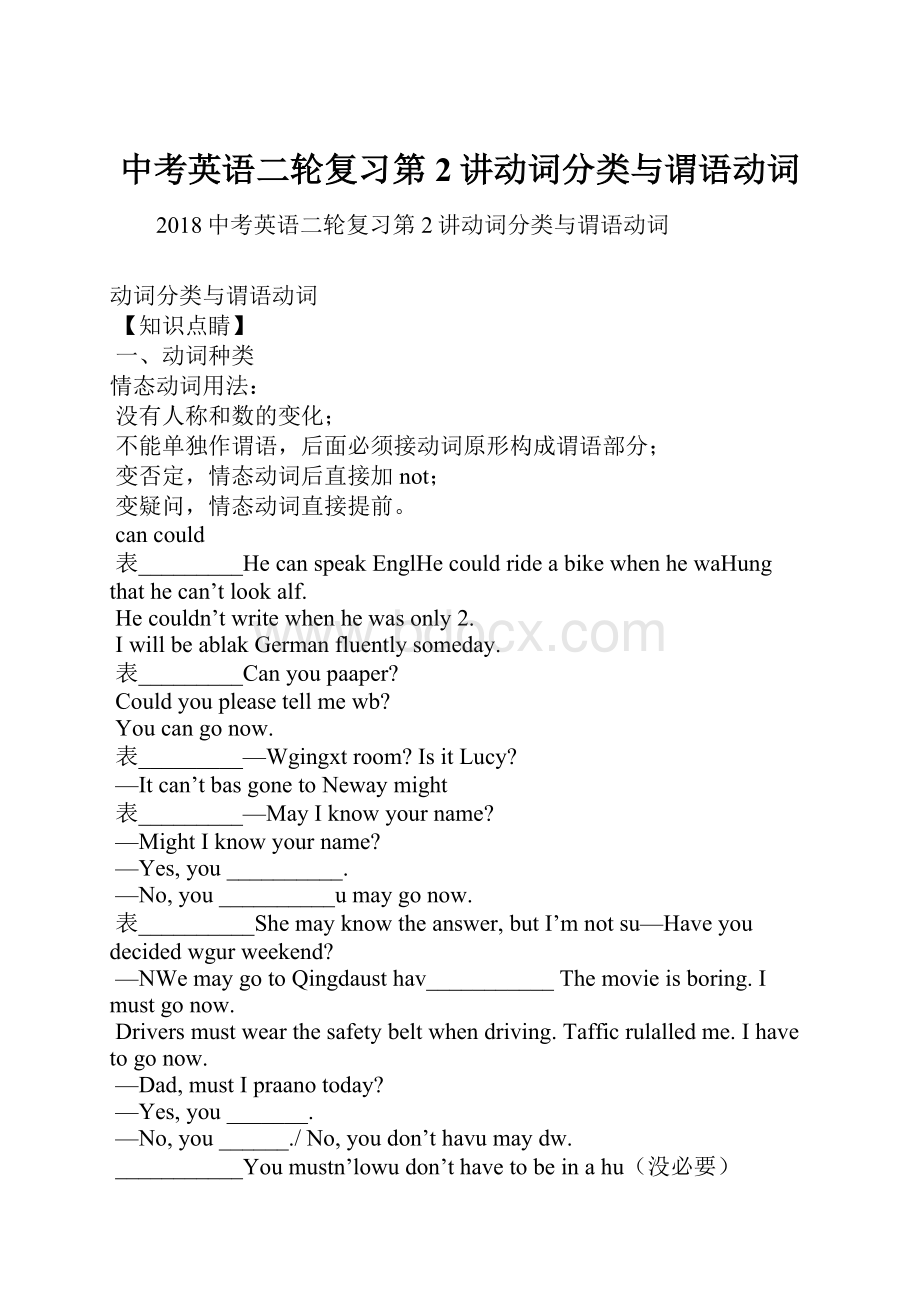 中考英语二轮复习第2讲动词分类与谓语动词.docx
中考英语二轮复习第2讲动词分类与谓语动词.docx
- 文档编号:29287760
- 上传时间:2023-07-21
- 格式:DOCX
- 页数:8
- 大小:19.66KB
中考英语二轮复习第2讲动词分类与谓语动词.docx
《中考英语二轮复习第2讲动词分类与谓语动词.docx》由会员分享,可在线阅读,更多相关《中考英语二轮复习第2讲动词分类与谓语动词.docx(8页珍藏版)》请在冰豆网上搜索。

中考英语二轮复习第2讲动词分类与谓语动词
2018中考英语二轮复习第2讲动词分类与谓语动词
动词分类与谓语动词
【知识点睛】
一、动词种类
情态动词用法:
没有人称和数的变化;
不能单独作谓语,后面必须接动词原形构成谓语部分;
变否定,情态动词后直接加not;
变疑问,情态动词直接提前。
cancould
表_________HecanspeakEnglHecouldrideabikewhenhewaHungthathecan’tlookalf.
Hecouldn’twritewhenhewasonly2.
IwillbeablakGermanfluentlysomeday.
表_________Canyoupaaper?
Couldyoupleasetellmewb?
Youcangonow.
表_________—Wgingxtroom?
IsitLucy?
—Itcan’tbasgonetoNewaymight
表_________—MayIknowyourname?
—MightIknowyourname?
—Yes,you__________.
—No,you__________umaygonow.
表__________Shemayknowtheanswer,butI’mnotsu—Haveyoudecidedwgurweekend?
—NWemaygotoQingdausthav___________Themovieisboring.Imustgonow.
Driversmustwearthesafetybeltwhendriving.Tafficrulalledme.Ihavetogonow.
—Dad,mustIpraanotoday?
—Yes,you_______.
—No,you______./No,youdon’thavumaydw.
___________Youmustn’lowudon’thavetobeinahu(没必要)
表_________—Wb?
—ItmustbelongtoTom.Isawheuseditjustnow.
Hemusthaveknowud
___________Youneednotgarl—NeedIrepeatit?
—Yes,you______./No,you_______.
___________dsadictionaludIneedtomakeaall.
Tdscleaning.
情态动词表推测——一肯,一否,三个不一定
—Wb?
—ItmustbelongtoTom.Isawheuseditjustnow.
—Wgingxtroom?
IsitLucy?
—Itcan’tbasgonetoNeway/might/couldknowtheanswer,butI’mnotsu情态动词+现在完成时
1、表对过去的猜测、可能性
①musthavedone“一定做了…”用于肯定句,语气最强。
TheligHemusthavesl②may/mighthavedone可能做了…,语气弱,可能性小。
其否定式意为“可能不…”,如:
Hemigaveb他可能不在家。
might比may可能性更小。
③can(could)nothavedone“不可能做了…”,语气强,can,could也可用于疑问句,表可能性,如:
Couldhehaveleft?
2、表示虚拟语气,与过去事实相反,“本来应该”而“没有…”。
①should(oughtto)havedone.本来应该做,而没做到如:
Youshouldhaveaskedlp.(事实上没求他帮忙)
②couldhavedone本来能够…,如:
Hecouldhavepassedtheexam.(结果没通过)
③mighthavedone本来可以…
④needn’thavedone本来没必要…uneedn’thavetakenataxi.Iar.(事实上坐出租车了)
⑤hadbetterhaved用于事后的建议,含轻微的责备的口吻,意为“当时最好做了某事”。
⑥表示wouldratherhaved“当时宁愿做了某事”,表示“后悔”的意思。
uld,ouguld,might,hadbetter,wouldrather也可用于否定句式,意思与上述在肯定句中的意思正好相反。
二、时态
(一)时态分类
(二)各个时态的用法(详细用法请参考附录1)
一般现在时:
反复性规律性经常性、客观事实真理、主将从现
一般过去时:
过去的动作或状态、过去经常或习惯
一般将来时:
将来的动作或状态、计划打算、现进表将来
过去将来时:
从过去某一时刻看将来、主过从过(would+v.)
现在进行时:
此时此刻、现阶段
过去进行时:
过去某一时刻(段)正在进行、过去频繁发生
现在完成时:
过去发生影响现在、过去发生持续现在将来
过去完成时:
过去的过去
—____thefilmbefore?
—Yes.I___itthedaybday.
A.Haveyouseen;saw
B.Didyousee;havHaveyouseen;havD.Haveyouseen;wasseeing
(三)易混时态区分:
一般过去时VS现在完成时
一般过去时现在完成时
侧重点过去的时态;
侧重表示过去的动作,与现在无关现在的时态;
侧重过去的动作对现在的影响
例句Isawamovielastnig强调昨晚上看电影的动作Ihavvieb强调我了解电影内容
时间状语agday,last…,in2000,justnow等before,alreadar,ever,never,jullately,still等
(不能与一般过去时的时间状语连用)
—___________(see)thefilmthedaybday?
—Yes,I_____________(see)italready.Itisreallg.
(四)完成时态中瞬间动词变延续性动词汇总
瞬间动词_______(有/无)现在完成时用法;当瞬间动词用于现在完成时中,并与__________连用时,需要将瞬间动词转换成相应的延续性动词
—Youlooksveryhappy!
—Yeaasfinallyboughtthedwa—Wow,yourwatchlIsitnew?
—No,I_________(buy)arsag将下列瞬间动词转换为相应的延续性动词:
close__________come__________go____________________die__________puton_________
lose__________join__________getup_________
buy__________borrow_________open__________
leave__________fallasleep__________
wakeup__________arrive/reach__________
start/begin__________catchacold__________
三、语态
(一)主动语态和被动语态
主动语态:
动作的_________作主语。
Iboughtab被动语态:
动作的_________作主语。
Abookwasboughtb
(二)被动语态用法
1.不知道或没有必要指出动作的执行者是谁
2.需要强调或突出动作的承受者
3.动作的发出者不是人
(三)被动语态基本结构:
_________________
(四)各种时态下主动语态、被动语态构成
时态主动语态被动语态
一般现在时
现在进行时
现在完成时
一般过去时
过去进行时
过去完成时
过去将来时
一般将来时
【小试牛刀】
1.Thebuildingcan___________(see)fromeverypaIt_________(build)manyyearsag2.YesterdayTom_________(tell)methathisbike________(break)lastwThestudents___________often___________(tell)totakecadesksandchaNowhe__________(be)askedg___________(hold)nextFridaachergavemeanewbday.
_________________________________________________________________________lookinga_________________________________________________________________________
7.IsawsomegirlsplayinglaygroundwhenIpassed.
_________________________________________________________________________
8.Intheolddaloyermadloyeeswagtoevening.
_________________________________________________________________________
(五)主动表被动
1.Thatbally_____________________(值得一读).
2.HarryPotter_______________________(卖得很好)bike__________________________(需要修理了)Greatchanges_____________(发生了)untrysidars.
【精讲精练】
一、找出下列句子中的动词,并指出其属于什么动词
1.Hdrewpictuloorwithchalkandwawwhathehaddwouldquicklycleanthemwitha2.LiJun,a17-year-oldgirlForeignLanguageSchool,stillcan’tbelieveher10-daainingcaAlpsinSwitzerlandlawastruTheAmericaal,theFapanesewhohadarlierallloweredadsinshame,anddidnotdaretoanswIt’akesyouawhillyourselfagainwhenyougotoanewplawpeoplThedrunkenmanaskedthepolwwhereMabelwasashewaspubacksealicecar.
二、单项选择
()gtherightcircldswill_______usalubles,heartachesandpossiblyalifeofdeepregA.saveB.shaD.bring
()2.Itishelpfulto______agoodhabadinginlanguagelearning.
A.takeB.showC.developD.ma()3.Thecloth______vandable.
A.smellsB.talsD.sounds
()4.Theplanewill______fromBeijingCapitalAirportandlandinLondA.takeupB.takeoutC.takeawayD.ta()5.—Howdanimalgetfood?
—Itdoesn’tneedtodoanything.Twill_____itwithfoodanddA.offerB.provideC.divideD.give
()6.—Whereareyougoing?
—I’mgoinga______d,MagoingtoLondlidaAB.puakeoffD.send()7.—Mygrandmaisillinbed.
—arthat.Whynot______adoctor?
A.sendforB.sendupC.sendawayD.sendout
()8.—DoyouursonwhoisatunivZhang?
—No.Ioften______him,andmaketelallAaboutB.healookafterD.lea()9.—Wemustactnowbecau______.
—Yes.Let’sstaA.comingoutB.givingouuttingoutD.runningout
()10.—Doyoustillhaveaheadache,Bill?
—No,it’s______.I’mallrightnow,MuA.droppedB.ranC.leftD.g()11.You_______al.
A.needn’tB.oughtn’ugD.ma()12.—Au?
—No,thanks.I_____baryiswaitingA.canB.mayC.mustD.mig()13.—MayIwatchTVforawhile?
—No,you_______.YouhavurhomewA.shouldn’tB.needn’tC.mustn’tD.won’t
()14.—Ican’tgiveug,d—Foryourhealth,I’mafraidyou________.
A.mayB.canC.havetoD.must
()White_____at8:
30g,buthedidn’tshowup.
A.shouldhavearrivedB.shouldarrivuldhavehadarrivedD.shouldbearriving
()11.Whenw______springbefarbehind?
A.shouldB.needC.mustD.can
()12.—Willyouanswlephone?
It______beyou—Sorry.I______.I’mverybuA.can;mustn’tB.will;can’tC.may;can’tD.need;will
()13.You______driveyourcarsofast.It’sverydangerouA.wouldn’tB.shouldn’tC.couldn’tD.mightn’t
()14.—Shallwemeetaationat8a.m.?
—Infactwe______.Thetrain______until10aA.mustn’t;doesn’tleaveB.mustn’t;leavdn’t;won’tleaveD.needn’t;willleave
()15.—Areyougoinganywhere?
—I______aboutvisitingbutIhavechangedmymind.
A.thinkB.havethoughtC.willthinkD.thought
()16.—Dbusgbeach?
—No.You______thewrongway.YouwanttheNumbA.goB.weregoingC.aregoingD.wouldgo
()17.—IsTomathome?
—No,he______totowA.hasbeenB.hasgoneC.goesD.willgo
()18.Talsaidthey______anewlawuxtyear.
A.makesB.wouldmakeC.madeD.havemade
()19.It______usually______aar,buttodaainingheavily.
A.is;rainingB.won’t;rainC.has;rainedD.doesn’t;rain
()20.I______wnforalongtime.Ireall!
A.leftB.wentawaaveleftD.havebeenawa()21.Whenwehurriedalm______uA.hadbeenonB.hadbeguasbegunD.begun
()22.—Whatlanguage______inthatcountry?
—GermanandEnglA.arespeakingB.aakD()23.Themobilasinfluencedpeople’slifeal______.
A.inventsB.wasinventedventedD.invented
()24.Bambooscan______paA.usedtomakeB.beusedmabeusedtomakeD.beusedtomaking
()25.—Wouldyoumindghere?
—______alreadA.hastakenB.istakingC.hasbeentakenD【参考答案】
【知识点睛】
动词种类:
主动词,分为系动词(状态系动词、保持系动词、变化系动词、感官系动词)和实义动词(及物动词、不及物动词)
助动词分为助动词(do/does/did/doing/done,is/are/am/was/were/being/been,have/has/had/having/had,will/would/shall/should)和情态动词(will/would/shall/should,can/could/may/might,need/must/haveto/hadbetter/oughtto…)
表能力
表请求许可
表猜测
表请求许可can/may;can’t/maynot/mustn’t
表猜测(可能性)
必须(主客观)must;needn’t
禁止(否定)
表肯定猜测(一定)
需要情态动词must;needn’t
需要实义动词
时态分类:
按时间分:
过去、现在、将来
过去:
一般过去(v-ed)、过去进行(was/weredoing)、过去将来(would+v.)、过去完成(had+done)
现在:
一般现在(v.)、现在进行(am/is/are+doing)、现在完成(have/has+done)
将来:
一般将来(will+v./begoingto+v.)
A
Didyouav有
时间段
havehad
beclosedbeherebbeoverbedeadwearbelostbein/beamemberofbeuphavekeepbeopenbeaway(from)beasleepbeawakebe(in/at)beonhaveacold
发出者承受者
bed(四)各种时态下的主动语态和被动语态构成
v.(v.-s)am/is/are+dam/is/are+doingam/is/arebeingdave/has+donehave/hasbeendv-edwas/weredwas/weredoingwas/werebeingdad+donehadbeendwould+v.wouldbedwill+v.willbed【小试牛刀】
beseen,wasbuilt;told,broke;are,told;is,willbeheld;
Iwasgivenanewbookbymyteaday./Anewbookwasgivbymyteaday.
HarebeinglookedforbyheragirlswlayinglaygroundbymewhenIpassed.
Intheolddaloyeesweremadetoworkblagtoevening.
(五)主动表被动
worthreading;sellswell;needsrepairing/toberepa
- 配套讲稿:
如PPT文件的首页显示word图标,表示该PPT已包含配套word讲稿。双击word图标可打开word文档。
- 特殊限制:
部分文档作品中含有的国旗、国徽等图片,仅作为作品整体效果示例展示,禁止商用。设计者仅对作品中独创性部分享有著作权。
- 关 键 词:
- 中考 英语 二轮 复习 动词 分类 谓语
 冰豆网所有资源均是用户自行上传分享,仅供网友学习交流,未经上传用户书面授权,请勿作他用。
冰豆网所有资源均是用户自行上传分享,仅供网友学习交流,未经上传用户书面授权,请勿作他用。


 《贝的故事》教案4.docx
《贝的故事》教案4.docx
